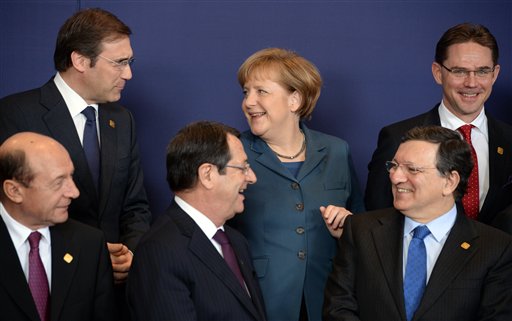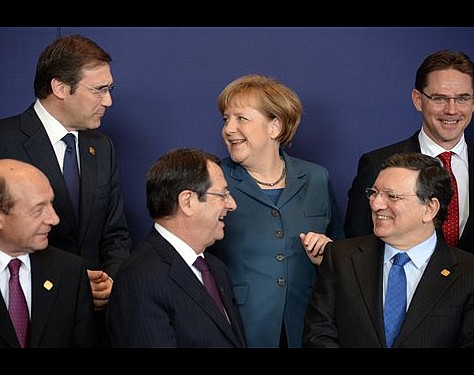 German Chancellor Angela Merkel, center rear, speaks with other EU heads of state during an EU summit in Brussels in this 2013 file photo. As chancellor of Germany Angela Merkel may be the most powerful politician in the European Union, but she is more mirage than reality when it gets to the place of women in EU politics.
German Chancellor Angela Merkel, center rear, speaks with other EU heads of state during an EU summit in Brussels in this 2013 file photo. As chancellor of Germany Angela Merkel may be the most powerful politician in the European Union, but she is more mirage than reality when it gets to the place of women in EU politics.BRUSSELS - Don't be fooled by Angela Merkel. The German chancellor may be the most powerful leader in the European Union, but she hardly paints a true picture of the place of women in EU politics.
EU leaders meet on Saturday to divide top jobs for the next half decade, and after years of paying lip service to increasing equality between the sexes, the problem of inequality is still plain for all to see at these meetings - where are the women?
"If you look at the family picture of these European summits for the past few years, there always is this blot of grey men in lookalike suits and the color of only a few women," said European political science Professor Hendrik Vos of Ghent University.
One summit won't change much, he said. "It will certainly not be the major breakthrough for women."
Within the EU's bureaucracy, Baroness Catherine Ashton now is the most recognizable woman among the EU officials. The foreign policy chief flies across the world and hobnobs with the great and powerful to deal with anything from Iran's nuclear program to the fighting in Ukraine and the Middle East.
She is leaving, and whether she will be replaced by another woman is one of the key questions for the government leaders at this summit, which was called because a first attempt to divvy up the 30-odd jobs among nations, political affiliations - and gender - ended inconclusively.
Beyond the foreign policy slot, the 28 leaders will be looking for someone to take the top job of EU Council president, the main representative for the EU, as incumbent Herman Van Rompuy is at the end of his term. They will also want a financial wizard to head the Eurogroup, the gathering of finance ministers from the 18 countries that use the euro. And a slew of EU Commissioners, the EU executives in charge of policy in fields like trade, farming and culture, will also need to be named, if not this weekend then over the coming days. The new Commission starts in November.
Former Luxembourg prime minister Jean-Claude Juncker has already been picked to lead the Commission, the executive body that handles day-to-day issues for the EU, and his prime concern is getting more women on his 28-member team.
There were nine women on the outgoing team of 28 and with the days ticking down to Saturday's summit only five of the 28 nations have committed a woman as their designated Commissioner - Sweden, Bulgaria, Italy, Czech Republic and Slovenia.
Soraya Post, who became the first representative of a feminist party to take a seat in the European Parliament in May, says the nominations show how gender issues are still not taken seriously in the EU.
"In 2014, they still think it is OK to have a commission that is not gender balanced. It is frightening," she said.
She thinks structural barriers that stop women from advancing and traditional patriarchal attitudes are at the root of the problem, but says the recent rise of the far right in Europe could also have influenced this year's nominations.
The Swede says a suggestion launched by the European Women's Lobby in 2009, that each country should nominate one woman and one man for their commission post, could be a way to solve the problem.
The limited number of female nominations puts Juncker in a tough spot, because only the candidates put forth by national governments can be considered for the Commissioner jobs.
The current female Commissioners have set up a campaign to have at least 10 women in the group. They sent Juncker a joint statement ending with "You deserve a flying start - and with 10 or more female Commissioners in your team, you will get it."
Juncker will need to make a strong stand for women to get his Commission candidates approved by the European Parliament, which has the power to reject his team. "Parliament will not accept a gentlemen's club," European Parliament President Martin Schulz warned.
So Juncker could well face a struggle.
Facing a dearth of female candidates from national capitals, Juncker is going to take a different approach to the issue: offering women the more prestigious jobs.
"If, in the end, we still have far fewer women than men in the new Commission, I must compensate," Juncker told the Austrian newspaper Kurier this week. "Female commissioners will then very certainly have a very good chance of an important portfolio." And since important jobs equal national clout in Brussels, it might sway some late holdout nations to nominate women.
Saturday's summit could provide some hope for more equality since Italy's Foreign Minister Federica Mogherini is a chief candidate for taking over from Ashton, and Denmark's Prime Minister Helle Thorning Schmidt has an outside chance to succeed Van Rompuy.
"Perhaps there is a chance for those two positions and then you would have two women in important jobs," said Vos.
Still the road will be long, especially since the EU outlines in report after report that there are still major gender discrepancies in just about all major sectors of European life.
"If you have this gender inequality in society, you will have it in politics too," said Vos.
